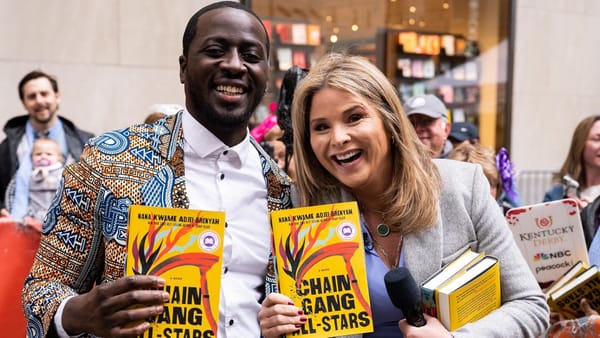The first stamp of approval I see on Nana Kwame Adjei-Brenyah’s National Book Award-nominated debut novel, Chain-Gang All-Stars, is the “Read with Jenna” sticker just below the author’s name. Jenna is Jenna Bush Hager, and to receive her approval guarantees that one’s book will be read by hundreds of thousands of her book-club members. Hager might not be Oprah, but her selections—just like Reese Witherspoon’s—are a game changer. The affluent white-lady demographic—Hager is one of their queens—is the one you want to solidify if you are an author.
The blurbs come next. The Empathy King of American letters, George Saunders, gushes that Adjei-Brenyah is “one of the most exciting young writers in America.” Charles Yu raves that Chain-Gang All-Stars is “a startling, important novel that will inspire and inform many conversations.” Jessamine Chan is similarly effusive: “a defiant, awe-inspiring novel that will be read, studied, and celebrated for generations, Chain-Gang All-Stars leads with love.” Chain-Gang All-Stars, as you should know by now, is a transcendent work of art. The National Book Award judges thought so, as did many other award committees; if I weren’t limited by a word count, I would list every award Adjei-Brenyah has been nominated for and won. The literary critics, that agreeable bunch, agreed, too—glowing reviews all around.
When I picked up Chain-Gang All-Stars, part of me was inclined to bestow yet another stamp of approval, but I just couldn’t do it. Adjei-Brenyah’s debut novel, following his critically acclaimed 2018 short-story collection, Friday Black, follows Loretta Thurwar and Hamara “Hurricane Staxxx” Stacker, inmates who fight for their freedom as the top gladiators on Chain-Gang All-Stars, a popular show in a dystopian American future. Thurwar and Stacker are black lesbian lovers, and the novel follows them as they navigate their relationship and Thurwar’s approaching release from prison. You see, the fighters are fighting for their freedom, every win getting them closer to freed status. Thurwar, after besting countless fellow inmates with her hammer in grotesque fashion, is weeks away from release.
The novel, highlighting brutality at every turn, can best be described as plodding and predictable. The outfit that runs the death matches, CAPE—Criminal Action Penal Entertainment—is as sinister as you would expect. The US audiences that watch the fights are likewise as bloodthirsty as you would expect them to be. On LinkLyfe, the reality-TV show that follows the fighters when they aren’t fighting for their lives, interpersonal drama is played up. Chain-Gang All-Stars, a supposed satire about the prison-industrial complex and the unquenchable American desire for mediated violence, is less a literary work than—as Charles Yu’s blurb implies—an ideological set piece that “will inspire and inform many conversations.”
